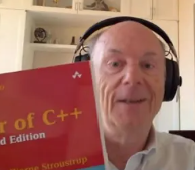Top 10 bugs found in C++ projects in 2022
New Year is coming! It means, according to tradition, it's time to recall 10 of the most interesting warnings that PVS-Studio found during 2022.
Top 10 bugs found in C++ projects in 2022
by Vladislav Stolyarov
From the article:
Here the analyzer detected that a function, marked as noexcept, calls a function that throws an exception. If an exception arises from the nothrow function's body, the nothrow function calls std::terminate, and the program crashes. It could make sense to wrap the setName function in the function-try-block and process the exceptional situation there — or one could use something else instead of generating the exception.

 Imagine Jonathan Wakely in a red suit with his helper elves, delivering presents:
Imagine Jonathan Wakely in a red suit with his helper elves, delivering presents: Hot off the video press:
Hot off the video press: ABSA == Ask Bjarne Stroustrup Anything:
ABSA == Ask Bjarne Stroustrup Anything: More safety please:
More safety please: